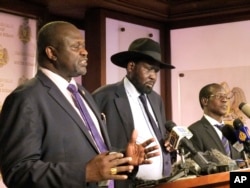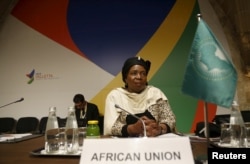The U.S. military has deployed about 40 soldiers to South Sudan’s capital, following days of clashes that left hundreds dead and raised fears of renewed civil war.
The military’s Africa Command says the troops were sent to Juba to safeguard the U.S. Embassy and help carry out a State Department order for non-essential personnel to leave the country.
The U.S. envoy in the region, Andrew Burnett, told VOA that senior U.S. officials also are working with leaders in South Sudan to end the fighting there.
Other countries, including Germany and India, are taking steps to evacuate personnel as a tenuous cease-fire declared by South Sudan's rival leaders on Monday continues to hold.
A spokesman for opposition leader and Vice President Riek Machar says he and his troops have withdrawn from Juba “to avoid further confrontation.” The spokesman told Reuters news agency that Machar is not returning to the bush or organizing for war.
The head of U.N. peacekeeping, Herve Ladsous, said Wednesday that 36,000 people have been displaced by the fighting and that 7,000 have taken refuge on local U.N. bases.
Addressing the U.N. Security Council, he said eight civilians were killed in the shelling of a U.N. protection-of-civilians site, and he called on the council to consider an arms embargo on South Sudan.
African Union summit
The South Sudan situation also is high on the agenda of the African Union summit in Kigali, Rwanda this week.
The chairperson of the African Union Commission, Nkosazana Dlamini Zuma, said Wednesday that the fighting in South Sudan “is totally unacceptable.”
“Governments and leadership are there to protect the vulnerable, to serve the people, not to be the cause of the people’s suffering,” she said.
South Sudan erupted in conflict in December 2013, five months after Kiir fired Machar as his deputy. Fighting between supporters of the two men killed tens of thousands and displaced more than 2 million people.
Under heavy international pressure, the rival leaders signed a peace deal last August and recently formed a transitional unity government that installed Machar as first vice president.






